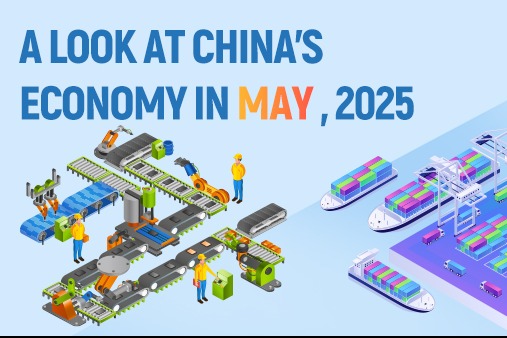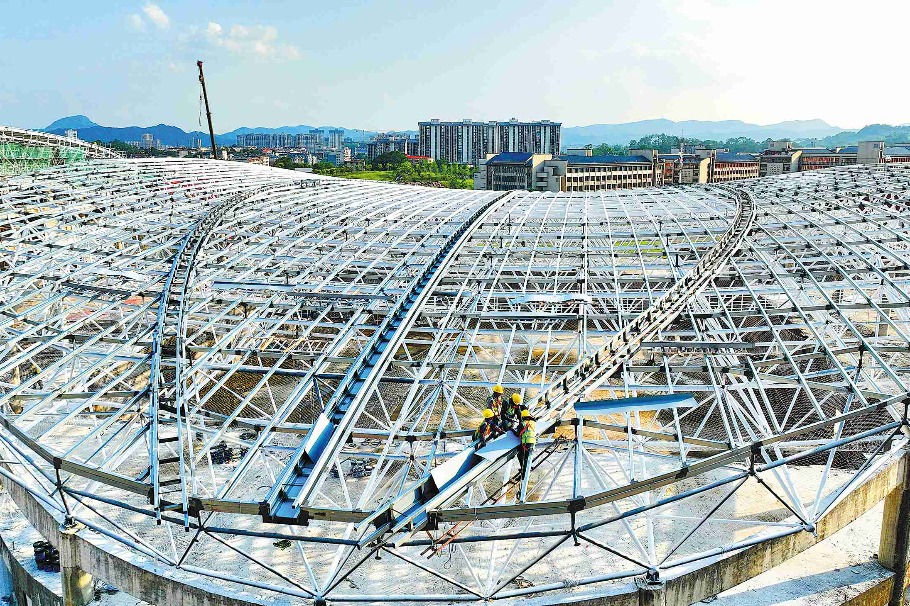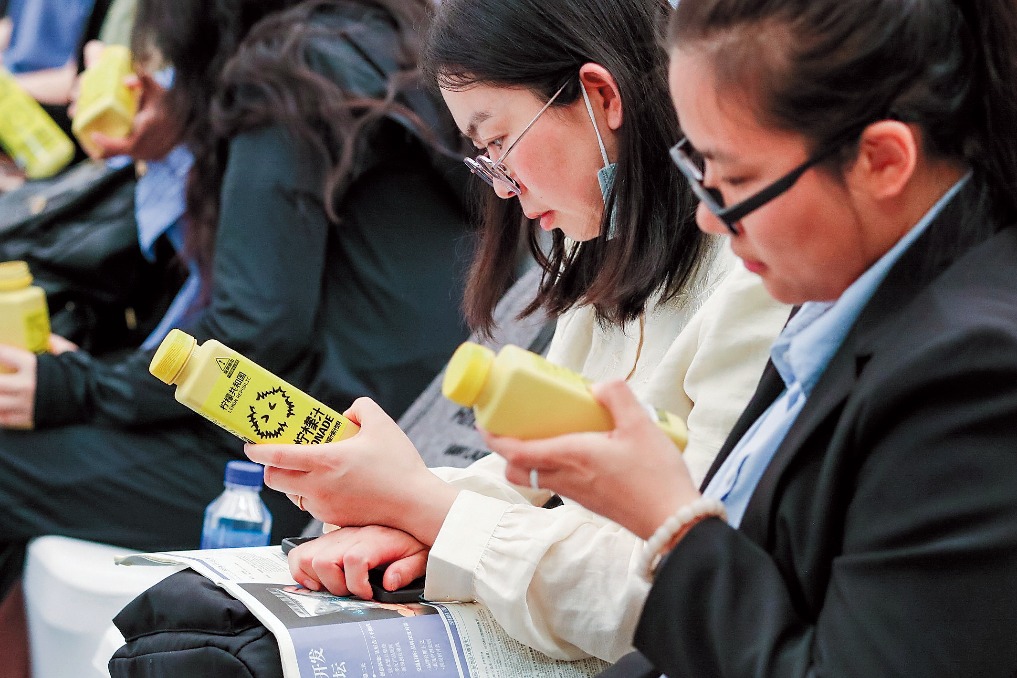Xi's Davos speech will 'highlight China's positive global role', WEF chief says

 |
| Klaus Schwab, founder and executive chairman of the World Economic Forum takes an exclusive interview with China Daily. [Photo by Fu Jing/China Daily] |
The past year has seen pressing challenges to the global economy and counteracting these will be a key feature of the World Economic Forum in Davos. In a nutshell, globalization is at risk.
China, however, remains a driving force both economically and in reshaping the multi-polar world and improving global governance. And encouragingly, Klaus Schwab, founder and executive chairman of the Geneva-based forum, has invited President Xi Jinping to deliver the opening address on Jan 17 during his state visit to Switzerland.
Xi will also visit the Lausanne-based International Olympic Committee and the headquarters of the World Health Organization in Geneva, and address a conference at the United Nations Office in Geneva before wrapping up his first overseas tour of 2017.
Schwab, whose organization started cooperation with China in 1979, has attached great importance to Xi's participation, the first for a Chinese president, and said it is relevant to the theme of the forum, which is Responsive and Responsible Leadership.
As the world is in transition into a multi-polar geopolitical and economic structure and China now equals the United States in terms of economic power, he predicts that Xi will be highlighting how China will play a positive role in global affairs at the forum.
Following is the text of the full interview conducted by China Daily journalist Fu Jing with Schwab.
China Daily: Can you tell us what should be the dominating theme of this year's World Economic Forum and why you think it is?
Schwab: In 2017 we are living in a truly multi-polar world where declining levels of global cooperation around our key shared challenges is a very real possibility. Against this backdrop, our theme reflects the clear need for those in positions of power to act both responsively by listening to, and understanding, the expectations of their people, and responsibly by being bold in providing and delivering a vision for a future that is sustainable and socially inclusive.
The areas where responsive and responsible leadership are needed the greatest include fostering growth, ensuring the global economy is more sustainable and socially inclusive, designing systems for better global cooperation and preparing the world for the Fourth Industrial Revolution.
This last area is of critical importance, as technology and innovation have the propensity both to eliminate so many jobs and positions but also to help humanity by creating millions more roles and building stronger societies. The imperative is to act now so that we have the governance and the values in place so that technology serves humanity rather than challenges it.
China Daily: Every year, China is a key topic in Davos. What are the major themes related to China? And what are your expectations of Chinese participants?
Schwab: China is an emerging superpower and we expect the country to play an increasingly active role as a responsive and responsible global leader. Areas where we are already seeing this happen is in catalyzing support for protecting the environment through the COP-21 Paris Agreement, acting as a champion for international trade and investment and in supporting development and infrastructure finance and moves to develop and expand the global digital economy.
At the meeting, there will be many sessions and discussions on how China's economy is adjusting to serve consumers, supporting innovation and upgrading its industrial base. Not to mention the country's role in global trade, investment and finance.
But participants also want to know more about China, and Chinese leaders. We are very pleased to be welcoming true world-class innovators of the likes of Jack Ma and Wang Jianlin, for example. And as China becomes better known for its innovative strength, we expect Chinese expertise to play a greater and more visible role in many critical areas of discussion, whether on infrastructure development, clean power or the Internet of Things to name just a few.
China Daily: China has started to play a proactive role in reforming global governance. As you observe, what is the major progress China has made with the rest of the world in previous years in improving global governance?
Schwab: As I mentioned, one of this year's core Davos discussions will be focused on updating and redesigning our systems for international cooperation in a world that is increasingly complex and multi-polar. China's leadership in the areas of climate change in support of the COP-21 Paris Agreement and its recent leadership of the G20 are good examples of the kinds of fostering such collaboration.
We also take encouragement from innovative approaches China has taken in the fields of infrastructure finance, through the AIIB and NDB and trade and Investment through the Regional Comprehensive Economic Partnership (RCEP) and One Belt, One Road initiatives.
I liked President Xi Jinping's use of a well-known Chinese proverb at this year's B20 summit when he said, “people with petty shrewdness attend to trivial matters while those with great wisdom attend to governance of institutions”. This to me perfectly sums up the importance that global governance holds for the collective health of our international community and reflects China's willingness to contribute to a fairer, more prosperous and sustainable planet.
China Daily: Clearly, the West entered a financial and economic crisis in 2008-09 before the world came together to find solutions. What is your view on the status quo now and the black swan events that have happened in the G7, almost one after another. How do you comment on the “political crisis” facing the West now?
Schwab: Political events in 2016 have made it very clear that levels of trust between political leaders and those that elected them have come under great strain. Burdens placed on leaders in today's complex and interconnected world have never been greater and the imperative now is for leaders to work together to strengthen our global systems, and to re-imagine new ways for international cooperation. One of the greatest challenges facing many of the G7 countries is the fact that income inequality has been allowed to increase, and leaders have lost their ability to listen to the needs of people.
Restoring this sense of responsiveness in 2017 and giving leaders the tools to set their country on a more inclusive path in 2017 will be one of the priorities at our annual meeting.
China Daily: Switzerland is a tiny country but one of global competitiveness and huge soft power, an excellent example for China. How should both countries carry on the momentum to deepen the partnership?
Schwab: Switzerland has a great number of competitive strengths: it is home to a number of world-class innovative companies and possesses excellent academic research establishments that work well with the private sector to commercialize new technology.
It also has a highly efficient, flexible labor market and a stable macro-economic environment. Switzerland's small size in terms of population has acted as a strong incentive to develop deep trading relationships with the EU and other partners around the world and to invest in developing its richest natural asset, its people, to help them develop entrepreneurial talents. Openness to trade and to developing innovation and entrepreneurial talent are all areas that China and Switzerland can work together on.
China Daily: China's businesses have made big strides in investing overseas, especially in Europe. And Switzerland is a major country which has facilitated such deals but some other countries have erected walls. So in your opinion, how do you comment on China's investment prospects in Europe in the coming years?
Schwab: China and Europe are important economic partners. About one third of China's outbound investment goes to Europe every year. I believe this is beneficial for China and for Europe. Political changes in 2016 have created a momentum for protectionism, however, we believe that when it comes to economic development, as with all other global challenges, international cooperation is the best way to create a win-win scenario.
This does not mean that globalization should be allowed to develop without any intervention. In its current form, it has been allowed to create an imbalance between winners and losers within countries and we have been arguing for over twenty years that market mechanisms need to be created to ensure greater returns on social inclusion and human development than our current system delivers.
It is my deep desire that at this year's annual meeting we are able to advance ideas and solutions that deliver a new, more human-centric model for growth and development.




































